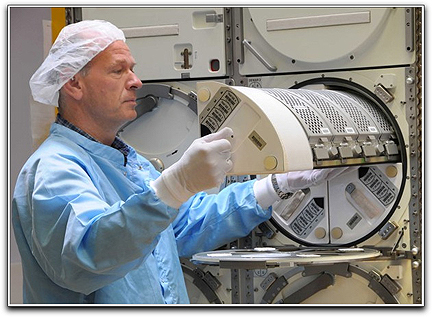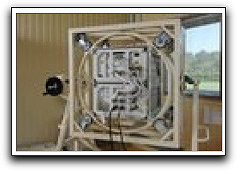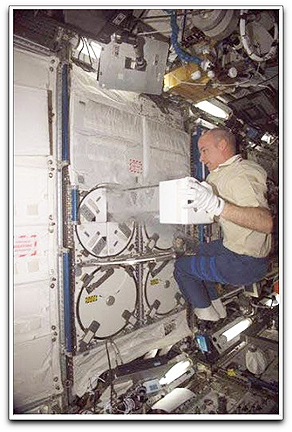Discovery will be launched for its space mission (STS-128) from Cape Canaveral, Florida (USA) on August 25th, weather permitting. On the fifth day of the mission, astronauts will transport the three facilities from the Shuttle's Multi-Purpose Logistics Module (MPLM) into the ISS. As the crew on ISS has been extended from three astronauts to six in total, additional scientific experiments are now possible. It also results in the need for more cold storage space, with a third freezer unit, which has been built by Astrium, due to be launched next year.
Satnews Daily
August 24th, 2009
More Discoveries for ISS, Courtesy Of Discovery Shuttle + Astrium
The U.S. space shuttle Discovery is set to carry three new research facilities to the International Space Station (ISS), which will enable more on board science to occur. The research facilities were built under the industrial leadership of Astrium. The new facilities are the Materials Science Laboratory (MSL), Declic, which will research fluid physics, and the second unit of the space freezer Melfi. With the help of this new equipment, scientists will be able to investigate processes which may lead to the development of new alloys, semiconductors and methods.
Discovery will be launched for its space mission (STS-128) from Cape Canaveral, Florida (USA) on August 25th, weather permitting. On the fifth day of the mission, astronauts will transport the three facilities from the Shuttle's Multi-Purpose Logistics Module (MPLM) into the ISS. As the crew on ISS has been extended from three astronauts to six in total, additional scientific experiments are now possible. It also results in the need for more cold storage space, with a third freezer unit, which has been built by Astrium, due to be launched next year.
 The Materials Science Laboratory (MSL) was developed and built on behalf of the European Space Agency (ESA) by a European consortium under the management of Astrium. MSL will be used for the investigation of basic processes in the production of metallic alloys and semiconductors, and for the measurement of thermo-physical properties of such materials. For this purpose, samples can be melted and solidified in different furnace inserts under accurately controlled conditions. The major aim of the research is the subsequent production of materials on Earth at an industrial scale with improved characteristics or at lower costs. Examples are high strength Aluminium alloys or X-ray image detectors, based on cadmium telluride. MSL operates fully automatically and transmits hundreds of measurement data per second to the scientific user centre MUSC in Cologne-Porz, Germany. During the experiment, all process parameters can be changed from the centre in order to guarantee an optimum experiment result.
The Materials Science Laboratory (MSL) was developed and built on behalf of the European Space Agency (ESA) by a European consortium under the management of Astrium. MSL will be used for the investigation of basic processes in the production of metallic alloys and semiconductors, and for the measurement of thermo-physical properties of such materials. For this purpose, samples can be melted and solidified in different furnace inserts under accurately controlled conditions. The major aim of the research is the subsequent production of materials on Earth at an industrial scale with improved characteristics or at lower costs. Examples are high strength Aluminium alloys or X-ray image detectors, based on cadmium telluride. MSL operates fully automatically and transmits hundreds of measurement data per second to the scientific user centre MUSC in Cologne-Porz, Germany. During the experiment, all process parameters can be changed from the centre in order to guarantee an optimum experiment result.
 Declic (Dispositif d'Etude de la Croissance et des Liquides Critiques, device for the study of growth and critical liquids), is a multi-user facility to investigate transparent media behaviour under a micro-gravity environment on board the ISS. It was developed and built by Astrium for the French space agency CNES. Declic will be used to conduct experiments on transparent media that can not be accurately observed on the ground. This can be applied to the process of solidifying transparent model alloys or with the peculiar behaviour of fluids near their critical point, in which they are in an intermediate state between a gas and a liquid. While these experiments will address fundamental and long-awaited issues for the international research community, they also have broad industrial applications in such diverse areas such as alloy metallurgy for the aerospace industry, supercritical water processes for a "green" removal of household/industrial waste from water, or storage of launchers and satellites propellant. Findings with Declic may in addition support the development of technologies for manned exploration of the solar system, like effluent free processing of human, plant and other organic waste. Once operational, Declic will be jointly used by CNES and NASA: CNES funded the development and NASA is responsible for transporting it to the ISS and providing the resources for its operation over three years. Declic will be remotely operated by the CADMOS User Support and Operation Centre in Toulouse.
Declic (Dispositif d'Etude de la Croissance et des Liquides Critiques, device for the study of growth and critical liquids), is a multi-user facility to investigate transparent media behaviour under a micro-gravity environment on board the ISS. It was developed and built by Astrium for the French space agency CNES. Declic will be used to conduct experiments on transparent media that can not be accurately observed on the ground. This can be applied to the process of solidifying transparent model alloys or with the peculiar behaviour of fluids near their critical point, in which they are in an intermediate state between a gas and a liquid. While these experiments will address fundamental and long-awaited issues for the international research community, they also have broad industrial applications in such diverse areas such as alloy metallurgy for the aerospace industry, supercritical water processes for a "green" removal of household/industrial waste from water, or storage of launchers and satellites propellant. Findings with Declic may in addition support the development of technologies for manned exploration of the solar system, like effluent free processing of human, plant and other organic waste. Once operational, Declic will be jointly used by CNES and NASA: CNES funded the development and NASA is responsible for transporting it to the ISS and providing the resources for its operation over three years. Declic will be remotely operated by the CADMOS User Support and Operation Centre in Toulouse.
 Astrium has developed and built three units of the "Minus 80 degrees Celsius Laboratory Freezer", Melfi for ESA. Melfi is a facility which provides the space station with refrigerated storage and the capability for fast freezing life-science and biological samples. In July 2006, the first unit was flown to the ISS on the STS-121 mission. Since then, Melfi-1 has successfully frozen and preserved biological and medical samples for science research in space. Such samples can be stowed in four compartments, whose temperature can be independently controlled at different levels (-80o Celsius, -26o Celsius or +4o Celsius). After their return to Earth, the human, animal and plant biological samples will be further analysed by scientists. The third unit which is currently at Astrium in Friedrichshafen will be delivered to the Kennedy Space Centre in September. There, further tests and the launch preparations will be conducted with the support of Astrium engineers. Subsequently, Melfi-3 is planned to reach the ISS with one of the last shuttle flights in mid-2010 and complete the "freezer fleet".
Astrium has developed and built three units of the "Minus 80 degrees Celsius Laboratory Freezer", Melfi for ESA. Melfi is a facility which provides the space station with refrigerated storage and the capability for fast freezing life-science and biological samples. In July 2006, the first unit was flown to the ISS on the STS-121 mission. Since then, Melfi-1 has successfully frozen and preserved biological and medical samples for science research in space. Such samples can be stowed in four compartments, whose temperature can be independently controlled at different levels (-80o Celsius, -26o Celsius or +4o Celsius). After their return to Earth, the human, animal and plant biological samples will be further analysed by scientists. The third unit which is currently at Astrium in Friedrichshafen will be delivered to the Kennedy Space Centre in September. There, further tests and the launch preparations will be conducted with the support of Astrium engineers. Subsequently, Melfi-3 is planned to reach the ISS with one of the last shuttle flights in mid-2010 and complete the "freezer fleet".
Discovery will be launched for its space mission (STS-128) from Cape Canaveral, Florida (USA) on August 25th, weather permitting. On the fifth day of the mission, astronauts will transport the three facilities from the Shuttle's Multi-Purpose Logistics Module (MPLM) into the ISS. As the crew on ISS has been extended from three astronauts to six in total, additional scientific experiments are now possible. It also results in the need for more cold storage space, with a third freezer unit, which has been built by Astrium, due to be launched next year.

